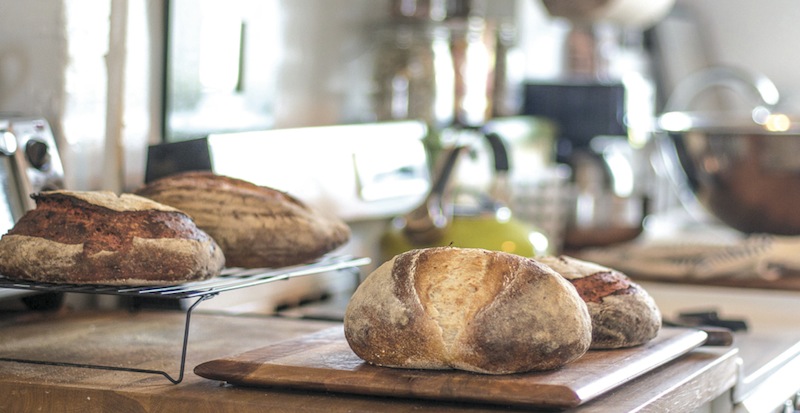It is 8:25 on a Wednesday morning and the oven in Sarah Owens’s top-floor apartment hisses furiously as she sprays water from a squirt bottle onto its walls. She slams the door shut, trapping the moisture inside. The morning’s second batch of sourdough test loaves — beet and potato-rosemary — is baking.
“The steam caramelizes the sugars in the crust,” she explains.
The kitchen’s ceiling fan pushes hot air around. Beyond the plants hanging in the sash window, BQE traffic streams past, skirting the townhouse’s back 40.
The first potato-rosemary loaf, cooling on the countertop, is round and shapely, but the baker is not satisfied: “I’m trying to get the hang of fendu” — the French word meaning cleft or split — “like ass cheeks,” she clarifies, cupping her hands around an imaginary and perfect bottom. “I want more shape, more definition,” now pressing a smooth wooden rolling pin gently into the middle of the soft mound of pale white dough under her hands.
It’s hot in here.
By the week’s end, 50 or so iterations of the best of today’s loaves will be included in the Greenwood Heights CSA boxes as well as delivered to the Brooklyn Botanic Garden for pickup by subscribers to Sarah’s fledgling community-supported baking (CSB) enterprise.
With the small oven occupied by the second batch, the slender baker pushes back an errant forelock and turns her attention to the butcher-block countertop, where an enormous stainless steel bowl makes her smile. “I love this bowl. I thought about taking a picture, naked, with it,” she says, twisting to profile and holding it up, inverted, against her lean torso, a big silver bump above her miniskirted tanned legs and bare feet.
Take that, Demi.
The bowl is new, on its maiden sourdough voyage. In it, she mixes levain with flour for epis — baguettes shaped like giant wheat ears, easily tearable at table.
This young sourdough start-up owes its existence to a medical misdiagnosis after Sarah’s return from a hiking trip in Morocco in 2011. While she had always suffered from some gastrointestinal distress, here was a spectacular low point: She lost 25 pounds in two weeks. Twice she was treated — unsuccessfully — for intestinal parasites. She then contacted a friend who had been diagnosed with Crohn’s disease and learned about his treatment, whose side effects were worse than the symptoms themselves. She decided to cut out bread and dairy, stopped going to the doctor and researched food intolerances and allergies. Browsing in a bookstore two Thanksgivings ago, she picked up what she recalls as a “hippy-dippy book about sourdough. I had flashbacks to my grandmother baking. It was this aha! moment.”
That December, she began to bake.
What defines sourdough is fermentation with lactic acid bacteria, rather than yeast alone. Lengthy fermentation gives sourdough not only its signature tangy flavor, but removes some phytate from the grains: “Phytic acid is plants’ main form of phosphorous,” Sarah explains. “It is there to prevent us from digesting it, or it can’t germinate.” And it is fingered as a culprit in digestive disorders.
Sarah sees this chemistry as a life saver. Once all the grains in her diet were fermented, she began to feel normal — for the first time in years. “It is amazing how my tolerance of other foods changed after I started eating sourdough,” she says.
The gospel according to bacteria.
Since 2009 Sarah has been the rosarian in charge of the Cranford rose collection at the Brooklyn Botanic Garden. But for the past 14 months, she’s spent just about every spare minute baking. The perfect loaf took time to evolve.
“The first loaves I baked were bricks!” she confesses. Persevering, she experimented with different methods and starters, connecting with bread geeks around the planet via Instagram. She carried the results to the BBG. Colleagues started asking for a loaf to take home, and BK17 Bakery was born, named after her borough, her street and in honor of the wild sourdough culture she captured in her kitchen.
Back in the kitchen, in the new bowl, today’s first set of epis is mixed with Hudson Valley Farmhouse Cider from Breezy Hill Orchards — fermented, effervescent and dry. The flour is buckwheat, milled by Cayuga, and sold at the Grand Army Plaza Greenmarket. “I order 50-pound sacks and carry them home in two Ikea bags,” Sarah says, shifting her tank top strap to reveal a welt across her clavicle.
Physical labor is not new to this 35-year-old Tennessean, but after five years of professional gardening, she admits, “my hands are starting to kill me. Fortunately, wetter doughs like this baguette you have to stretch and fold to develop the gluten, which means I don’t have to knead.”
She forms the pliant dough into long, soft slug shapes and dusts them with flour and coarse semolina, then covers them with plastic to rest.
The second test batch emerges from the oven. The beet bread has a flatter shape than the hilly fendu. It is made with high-extraction flour and beets she peeled and roasted (“I didn’t want to boil out the nutrients”), then pulsed in a food processor. It is chewy, moist and earthy, the color of watered red wine. I spread black currant jam on my slice.
A sip of coffee, a slug of cider, a bite of fresh bread. Breakfast in Brooklyn.
Fridays signal a lunatic schedule in this kitchen: At 3:30 a.m., before her regular work-day starts, she begins to bake loaves for delivery to the BBG. Then, after a full day tending her rose garden, the rosarian arrives home to prep her Saturday quota for the Greenwood Heights CSA. She bakes from 6 p.m. to 3:30 a.m.
“Friday nights around 1 a.m. I’m, like, ‘What the hell am I doing?’ At 3 a.m. I have never been so tired. But when I wake up at 6 a.m. I feel wonderful.” She loads the Ikea bags with bread and walks them to the Greenwood Heights CSA on 19th and 6th Avenue. “I love delivering my bread.”
The buckwheat epis, rested and risen, are shaped into wheat ears; a pair of kitchen scissors snips expertly into the soft dough. “I like to make pretty things,” she murmurs. “I dream about what I could do with a commercial oven.”
While the apartment kitchen is not certified by the Department of Health, Sarah has a food handler’s license and operates as a home processor, in compliance with NY State standards. And luckily, she adds, “my landlords are tolerant — they live downstairs and are members of the CSA and eat my bread.”
She dons heavy oven mitts and leans down to slide the first epis from the oven. They are plump and golden, biblical ears of wheat.
“It’s just flour and water and salt, a very simple formula. There’s fire, there’s water, there’s earth. Air. That’s what I’ve made my life all about, y’know? Fooling around with nature.”
Find out more: Read about fermentation fever here.
Photo Credit: Marie Viljoen






